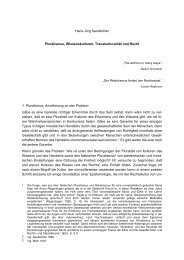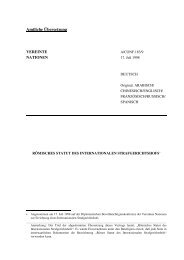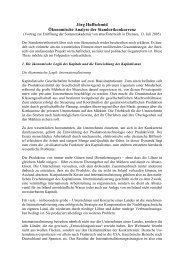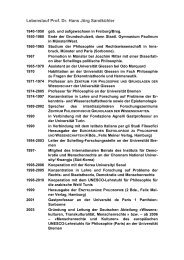Allgemeine Erklärung über Bioethik und Menschenrechte - Unesco
Allgemeine Erklärung über Bioethik und Menschenrechte - Unesco
Allgemeine Erklärung über Bioethik und Menschenrechte - Unesco
Sie wollen auch ein ePaper? Erhöhen Sie die Reichweite Ihrer Titel.
YUMPU macht aus Druck-PDFs automatisch weboptimierte ePaper, die Google liebt.
Universal Declaration on Bioethics and Human Rights | 51<br />
with Disabilities adopted by the General Assembly of the United Nations in 1993,<br />
the UNESCO Recommendation on the Status of Scientific Researchers of 20 November<br />
1974, the UNESCO Declaration on Race and Racial Prejudice of 27 November<br />
1978, the UNESCO Declaration on the Responsibilities of the Present<br />
Generations Towards Future Generations of 12 November 1997, the UNESCO Universal<br />
Declaration on Cultural Diversity of 2 November 2001, the ILO Convention<br />
169 concerning Indigenous and Tribal Peoples in Independent Countries of 27 June<br />
1989, the International Treaty on Plant Genetic Resources for Food and Agriculture<br />
which was adopted by the FAO Conference on 3 November 2001 and entered into<br />
force on 29 June 2004, the Agreement on Trade-Related Aspects of Intellectual<br />
Property Rights (TRIPS) annexed to the Marrakech Agreement establishing the<br />
World Trade Organization, which entered into force on 1 January 1995, the Doha<br />
Declaration on the TRIPS Agreement and Public Health of 14 November 2001 and<br />
other relevant international instruments adopted by the United Nations and the specialized<br />
agencies of the United Nations system, in particular the Food and Agriculture<br />
Organization of the United Nations (FAO) and the World Health Organization<br />
(WHO),<br />
Also noting international and regional instruments in the field of bioethics, including<br />
the Convention for the Protection of Human Rights and Dignity of the Human<br />
Being with regard to the Application of Biology and Medicine: Convention on Human<br />
Rights and Biomedicine of the Council of Europe, which was adopted in 1997<br />
and entered into force in 1999, together with its Additional Protocols, as well as national<br />
legislation and regulations in the field of bioethics and the international and<br />
regional codes of conduct and guidelines and other texts in the field of bioethics,<br />
such as the Declaration of Helsinki of the World Medical Association on Ethical<br />
Principles for Medical Research Involving Human Subjects, adopted in 1964 and<br />
amended in 1975, 1983, 1989, 1996 and 2000 and the International Ethical Guidelines<br />
for Biomedical Research Involving Human Subjects of the Council for International<br />
Organizations of Medical Sciences, adopted in 1982 and amended in 1993<br />
and 2002,<br />
Recognizing that this Declaration is to be <strong>und</strong>erstood in a manner consistent with<br />
domestic and international law in conformity with human rights law,<br />
Recalling the Constitution of UNESCO adopted on 16 November 1945,<br />
Considering UNESCO’s role in identifying universal principles based on shared<br />
ethical values to guide scientific and technological development and social trans-













